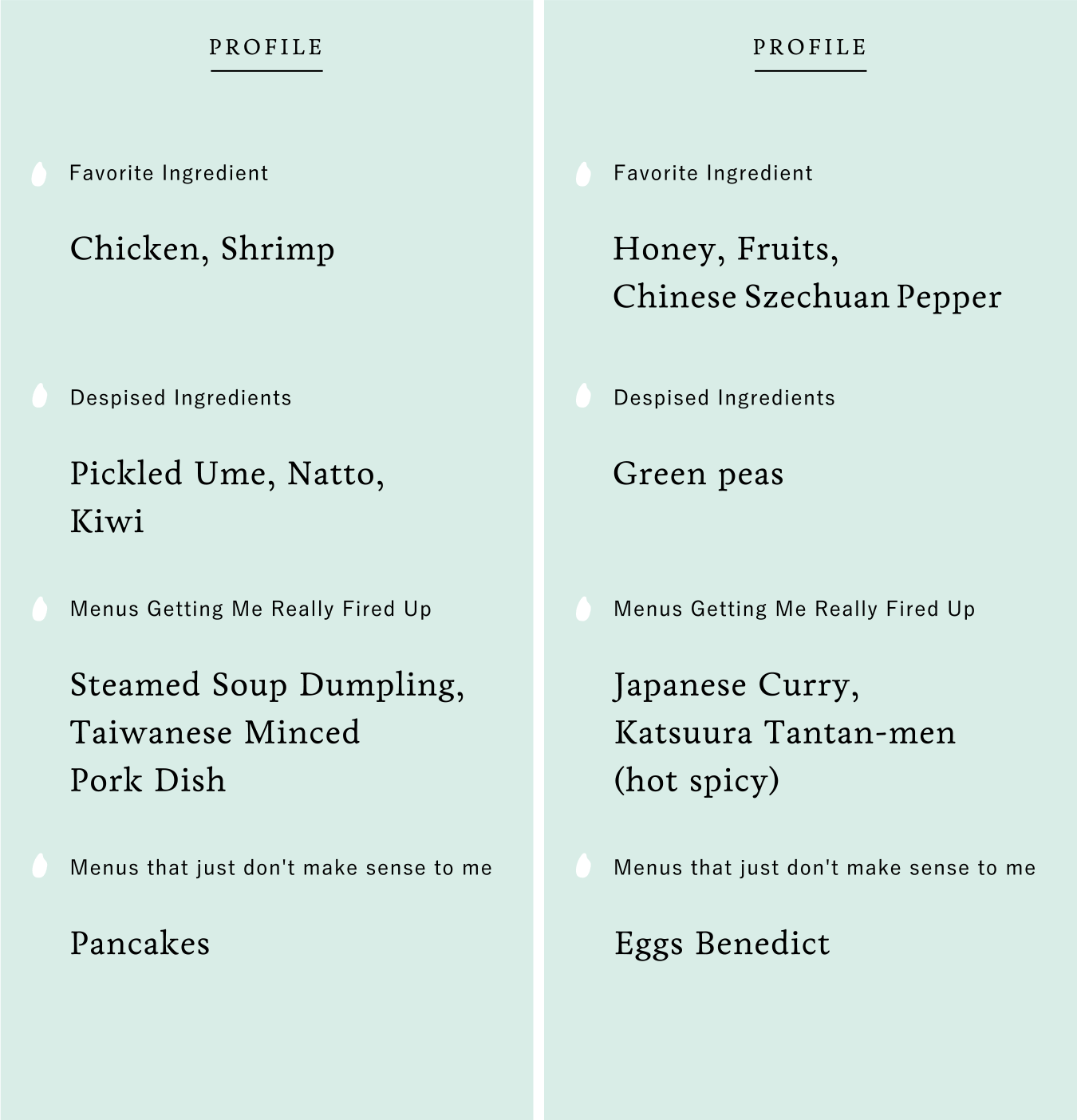──台日系カルチャーの架け橋的マガジン『離譜』を出版されているおふたりですが、「食」と「旅」と「人」でふたつの国の違いを感じますか?
田中 感じますね。2010年にはじめて台湾へ行って以来、年に20回ほど旅するぐらい台湾を好きになったんですけど、そんな感じだと「もう住んじゃえばいいじゃん?」と友人たちからは言われるんですね。でも、僕は「まれびと(稀人)の視点」というのを大切にしていて。元々は民俗学者の折口信夫さんの言葉なんですけど、まれびとだからこそ感じられるなにかがある。台湾にずっと住むよさはもちろんあるんですけど、あの国とある程度の距離をとっているからこそ、たとえば1週間の旅の間に立っているアンテナの感度が違というか。
西山 すっごいおなかがすいている状態で、ごはんを食べる時みたいな?
田中 そうそうそう。ハングリーな感じ。台湾に対して、ハングリーでいたいのかもしれません。とにかく魅力的な国だから。日本と台湾は、似ている部分とまったく違うところがおもしろいです。たとえば、洋服屋さんを出したい人がいたとして、日本人の多くは、考えて考えて細部まで詰めてから最後にアウトプットすると思うんです。でも、台湾人の場合は、見切り発車感がすごい。ある時、台湾のファッションストリートに素敵な洋服屋さんができたなぁと思ってのぞいたら、肝心の洋服がひとっつも置いてなかったんですよ(笑)。でも、現地のクリエイターの人と話していると好きなミュージシャンが共通していたりとルーツが似ているから話が盛り上がる。逆にいうと、ルーツは違うのに表現されたり、表現に至る道のりが全然違う。そういうところがおもしろいですね。
──As a publisher of the magazine ‘LIP,’ a bridge between Taiwan and Japan, please tell us about difference about ‘food’ ‘travel’ and ‘people’ between these two countries.
Tanaka : I do feel difference. Since 2010, when I firstly visited Taiwan, I like Taiwan so much that I even go on a trip to Taiwan like 20 times per an year. While my friend told me that “Why don’t you move in there?” I put a value on the “Guest from Afar.” As Shinobu Orikuchi, a folklorist, mentioned that there is something meaningful that the guest from afar can sense. I guess experience for long-term stay in Taiwan has many benefits, but with a certain degree of distance, even a week-long trip can increase my sensibility.
Nishiyama : Like the time you eat, when you’re really hungry?
Tanaka : Yes! The same thing happens to me when I went to Taiwan, because it is a fascinating country.
It is interesting that Japan and Taiwan has both common and different points. For instance, for someone who wants to open a clothes shop, many Japanese would obtain the results after thinking and thinking. On the other hand, Taiwanese shows a very impressive spirit. One time, when I looked in the windows as there was a new clothes shop on the fashion street in Taiwan, I found no single clothes there (laugher)! Nevertheless, it’s always exciting and funny to talk to the local creators, as we have common favorite artists, or there is a similar word between two countries. Despite similar origin, expression or style of the word is very dissimilar over the left. This is really interesting.

──その頃いっぽう、西山さんと台湾の距離感は?
西山 私は、自分が偏食だというのもあるんですけど、台湾と日本の違いと言えばパンと麺が思い浮かびます。日本とは小麦粉が違ったり、グルテンの量が異なるかららしいんですけど、もちもちしていておいしくて。台湾の友達は「日本のパンのほうがおいしい」と言うんですけど、私は麺も台湾派。メジャーな牛肉麺はもちろん、「意麺」という平たくて腰のある麺にチャーシューと野菜をのっけただけの汁なし麺は絶品だと思います。
田中 あれはおいしいね! LIPの本でも紹介しているんですけど、台南には名前のない意麺屋……本当に店名がないんですけど……そのお店が僕らの一おしです(※『LIP的台湾案内 こんにちは! 新しい台湾』P62参照)。
西山 ただ、そんな本まで出させてもらってあれなんですけど、私は田中に誘われて台湾に行くまで海外旅行というものの経験がなかったんです。というか、いまでも海外旅行と言えば、台湾しか行ったことがないんですけど。
──なるほど(笑)。そんな台湾と日本を独自の視点でつないでいるLIPさんにとって、ライスワークとライフワークは一致していますか?
田中 実は、西山はふたつの仕事をしているんです。『離譜』のアートディレクターと、自身のファッションブランドのデザイナーのふたつを。
──では、西山さんの場合は?
西山 私は一致していると感じています。前職をやめた理由がまさにそうだったんですよ。すごく勉強させてもらったし感謝もしていますけど、心のどこかにずっとわだかまっていたのは、時間を売りたくないという感覚。だから、LIPではそれだけはしたくないと思ってきました。もちろん、LIPや服の仕事だけでは食べられない時期もあったんですけど、そういう状況でも、ギリギリやりたいことをしようと考えていて。
──Then, how about distance between you and Taiwan at that time?
Nishiyama : Well, as I do pick at my food, your question reminds me of the bread and noodle. It has different flours, and the volume of gluten, and it tastes really good. Although my Taiwanese friend seems to like Japanese bread better, I would select Taiwan when it comes to the noodle: in addition to popular beef noodles, ‘Yi noodle(意麺), a deep fried thick noodle with a roast pork and vegetables, is fabulous.
Tanaka : It is delicious! We also recommended the Yi noodle’s no-name restaurant – the restaurant has truly no name – located in Tainan in our book ‘A Guide to Taiwan from LIP’s perspective: Hello to New Taiwan! (P.62)’
Nishiyama : Well, to be honest, I have never been to other country until Tanaka asked me to join his trip to Taiwan. Even for now, I have only been to Taiwan.
──Wow(laughter). This is another question to you both: connecting Taiwan and Japan through your unique perspective, does your rice work match your life work?
Tanaka : To tell the truth, Nishiyama has two different jobs, as an art director of LIP and as a fashion designer of her own brand.
──So Ms. Nishiyama, could you tell us about your story?
Nishiyama : I feel it matches well. The reason why I quit my job was just like that. I learned a lot from my previous job, but the hesitance about ‘wasting my time’ bothered me. In LIP, I still hate to waste my time. Of course, there were periods that I couldn’t make a living with LIP and fashion works, but in such a situation, I still wanted to be able to do the things I want to do.


田中 プラモデラーとかね。
西山 そうそう。プラモデラーって、要はプラモデルを誰かに代わって作るんですけど、箱ごとがっと渡されて、組立てて塗装して、それで、けっこうなギャランティがもらえる仕事なんですけど。
田中 それは西山にとってライスワークだったってこと?
西山 ある意味ではそうなのかなぁ。だって、私はプラモデルを組立てるために独立したわけではないから。
2人 (笑)。
西山 でも、物を作るのは嫌いじゃないから、「時間を売ってる」という意識はゼロでした。あと、私は仕事って偉大だなぁと思う瞬間があるんですけど、プラモデラーの仕事とは別の衣装の仕事のはじまりの時にそれを感じたんです。プロ野球チームの始球式用衣装の仕事を発注してもらえたのがきっかけだったんですけど、私はプロ野球にも衣装にもとくに興味はなかったんです。でも、やってみたらおもしろくて、それ以来、衣装という仕事に興味が持てたんです。お金をもらいながら勉強させてもらえるだなんて、仕事ってありがたいなぁって。だから、ライスワークとライフワークが一致しているかどうかって、世の中からの見え方じゃなくて、本当の自分がどう感じているんじゃないかなぁ。
田中 あぁ、そういうこと?
西山 たぶん、そういうことですよ。
2人 (笑)。
──この連載が始まる前の仮タイトルは「喜怒哀楽ごはん」でした。食と人の感情はリンクしているのではないか。そして、喜怒哀楽のうち、どの感情とつながった食を真っ先に思い浮かべるかで、人となりが伝わるのではないと。
田中 そっちのテーマもおもしろそうですね! なにが思い浮かぶ?
西山 そうめん和え麺。
田中 あれは……「哀」だったなぁ。
西山 「哀」だったね。私は前職をやめたばかりでとにかくお金がなくて、そうなるととにかく食費を浮かせるしかなくて。それで当時、頻繁に食べていたのが、そうめん和え麺だったんです。麺つゆにひき肉とたまねぎと薬味を加えたものを、あたためたそうめんにかけて混ぜて食べるという。
田中 それなりにおいしいんだけど、以前、「久しぶりに食べてる?」と試してみたら……。
西山 お互いに口数が減り……。
田中 おいしいんですよ。おいしいんだけど……。
西山 ごはんをたべていてあんな気持ちになったのははじめてでした。
田中 はじめてだったね。うまくて切ないってどういうことだよっていう。
2人 (笑)
Tanaka : Like plastic modeler.
Nishiyama : Right! Plastic modeler refers to a person who builds a plastic model, assembling the model, and there is money in it.
Tanaka : So, was it your rice work?
Nishiyama : In some ways, it is true. I mean, I did not quit my job for assembling the plastic model.
Tanaka & Nishiyama : (laughter)
Nishiyama : But I do not hate to make things, so it was not a waste of my time. Well, I face situations when I feel that work is really great, and it was when I just started the fashion works. It was the clothes for opening ceremony of a ball game, and at that time I was not interested in clothes for major league baseball. But I really enjoyed my first attempt, and since then, fashion works intrigued me: learning while earning some income, what a nice job! That’s because whether you feel rewarded from the work that you make a living, depends on not what others think, but what you think and feel.
Tanaka : Oh, you think so?
Nishiyama : Yes.
Tanaka & Nishiyama : (laughter)
──Before beginning this series, the working title was “the joys and sorrows of food.” Is there a connection between the food and a person’s feeling? We construed that the food you remind at first correlated with the emotion of the joy, anger, sorrow and pleasure.
Tanaka : The topic seems very fascinating as well! What do you remind?
Nishiyama : Plain noodle.
Tanaka : That was… ‘sorrow.’
Nishiyama : Yes, it was ‘sorrow.’ After stopping my work, I had no much money left and then I had to restrict my expenditure on food. At that time, I often ate the plain noodle by adding the noodle sauce, the minced meat, onion, and spice.
Tanaka : Well, it is tasty, but when we tried it after a long time…
Nishiyama : We all became very quiet…
Tanaka : It is delicious. It is, but…
Nishiyama : It was my first time to have such feelings when I eat the food.
Tanaka : True. It was delicious, and at the same time it saddened my heart.
Tanaka & Nishiyama : (laughter)
田中 で、戻っていいですか? ライスワークとライフワークの話に。
西山 あ、まだ話し足りないことがあったんだ(笑)。
田中 うん。西山の話を聞いていて感じたのは、僕は未来のライフワークのために、いまのライスワークを重ねてきたのかもしれないということでした。いや、違うな。いまのライスワークではなくて、生活の糧にさえなっていないような「いま」の仕事でも、自分がやりたいことを続けていたらある日ライスワークになって、かつ、ライフワークと一致してくれたように思います。『離譜』のはじまりもそうで、当時は大学生というアマチュアだったんですけど、だからこそ作れる雑誌があるかもしれないと始めたんですね。勝算なんてまったくなくて、見切り発車もいいところでしたけど、いまでは僕らにとっての大切なメディアになってくれて。そういう意味では、僕の見切り発車感は、日本人のくせに台湾の方のノリに近いのかもしれないです(笑)。
Tanaka : Can we return to the subject of rice work and life work?
Nishiyama : Do you want to say more about this? (laughter)
Tanaka : Yes. From Nishiyama’s story, I realized that I have gained my experience of rice works in order for my future life works. No, it’s not true. Even for ‘current work’ that hardly makes for my living, if you keep working on what you want, one day it will be a rice work. The beginning of the LIP was just like that, and I was a student at that time, but I started the work anyway as I believed that there is a magazine that can be only made by myself as a student. Such a hopeless war at the beginning, but now, you know, LIP is the precious media for us. In the sense, my spirit is more similar to Taiwanese, than Japanese (laughter).

















